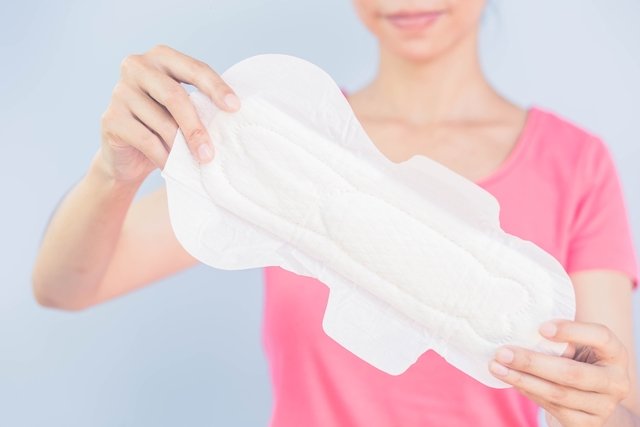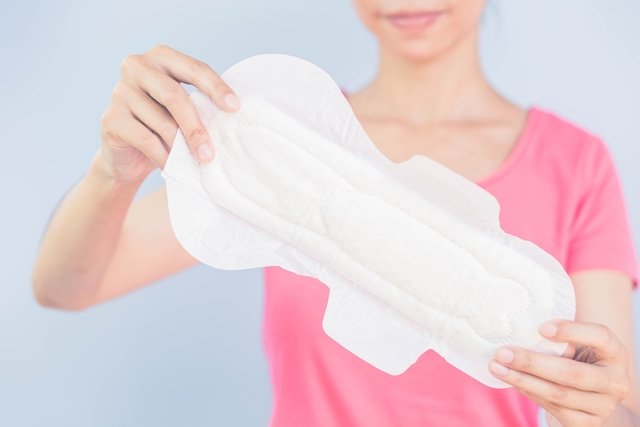The postpartum absorbent to be used depends on the type of birth, because after a cesarean section, it is possible that the bleeding flow will be less, when compared to the flow after a natural birth. However, in both cases, it is recommended that large, thick pads be used, which have high absorption power.
Bleeding is more intense during the 3 days following birth, and the use of postpartum pads, which are larger and go from the middle of the buttocks to the upper part of the pelvis, or a common nighttime pad, may be recommended. which is also larger than the normal absorbent, but is smaller than the postpartum absorbent, making it necessary to change it more frequently.
As the bleeding after childbirth decreases, it is possible to change the type of absorbent used, being able to choose to use a normal absorbent, panty liners, fabric absorbent or absorbent panties, the use of tampons is not recommended due to the increased risk. infection, for example. Find out more about the types of absorbent.

1. Why is it necessary to use sanitary pads postpartum?
After childbirth, it is common for bleeding to occur, known as “lochia”, which results from the trauma caused by childbirth in the woman’s body. In the first few days this bleeding is red and intense, but over time it decreases and changes color, until it disappears 6 to 8 weeks after birth. Learn more about lochium.
The intensity of the bleeding can vary according to the type of birth, so that after a natural birth it is possible that there will be heavier bleeding than after a cesarean section, for example, as in a cesarean section part of the blood leaves together with the placenta.
2. How to maintain intimate hygiene in the first few days?
To make the woman feel safer, she should wear large cotton panties, as she wore during pregnancy, and to avoid infections, it is important to always wash her hands before changing the pad.
The woman can clean the intimate area with just toilet paper after urinating, or if she prefers, she can wash the external genital area with water and intimate soap, drying it with a dry, clean towel afterwards. It is not recommended to wash the vaginal area with a vaginal douche because this alters the vaginal flora, favoring infections, such as candidiasis.
Wet wipes are also not recommended to be used frequently, although it is a good option to use when in a public bathroom, for example. Regarding hair removal, it is not recommended to use a razor daily, as the skin will become more sensitive and irritated. Complete shaving of the vulva region is also not recommended as it favors the growth of microorganisms and causes greater vaginal discharge, facilitating the appearance of diseases.
3. When does your period return?
Menstruation may take a few months to return after the baby is born, being directly linked to breastfeeding. If the mother exclusively breastfeeds her baby for the first 6 months, she may go this entire period without menstruating, but if she adopts bottle milk or if she does not breastfeed exclusively, menstruation may return the following month. However, in some cases, it is possible for menstruation to return during the breastfeeding period depending on female hormone levels.
4. When to go to the doctor?
It is recommended to go to the doctor if, during the 40-day period after giving birth, the woman presents:
- Pain in the lower part of the belly;
- Experience vaginal bleeding with a strong and unpleasant smell;
- Have a fever or red discharge more than two weeks after giving birth.
These symptoms may indicate an infection and therefore a medical evaluation is necessary as soon as possible.
Every time a woman breastfeeds in the first few days she may feel a small discomfort, like cramping, in the abdominal region, which is due to the decrease in the size of the uterus, which is a normal and expected situation. However, if the pain is very intense or persistent, you must inform the doctor.

Sign up for our newsletter and stay up to date with exclusive news
that can transform your routine!
Warning: Undefined array key "title" in /home/storelat/public_html/wp-content/plugins/link-whisper-premium/templates/frontend/related-posts.php on line 12
Warning: Undefined array key "title_tag" in /home/storelat/public_html/wp-content/plugins/link-whisper-premium/templates/frontend/related-posts.php on line 13




